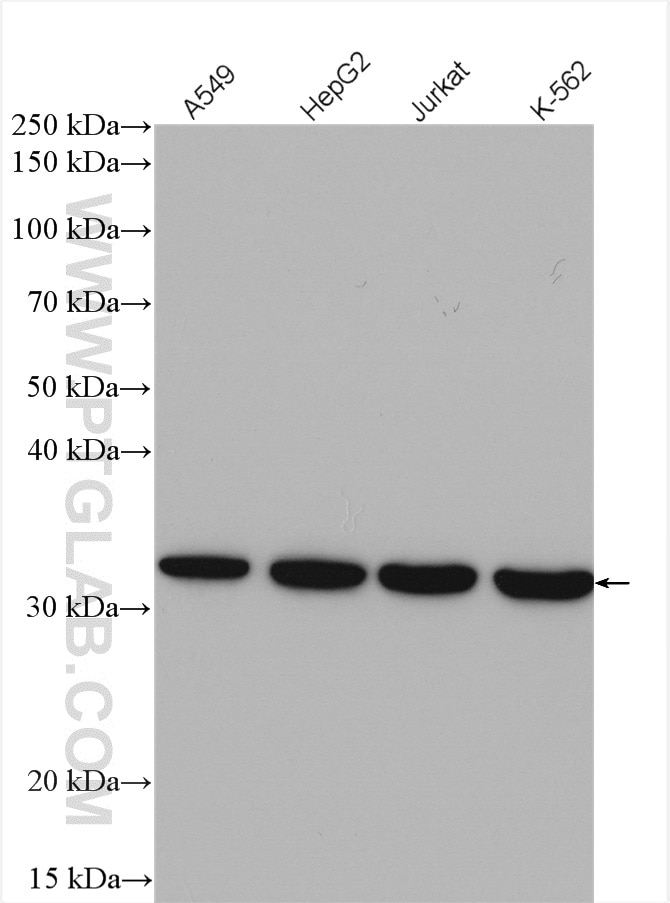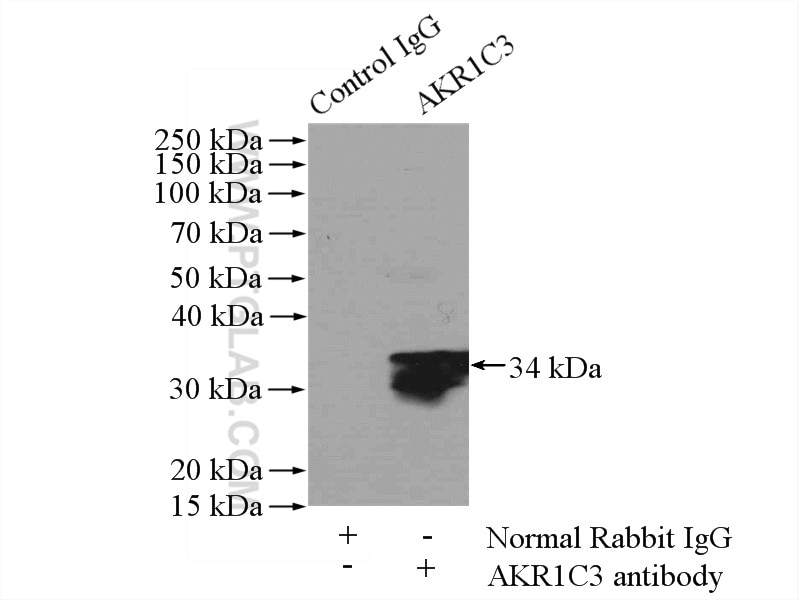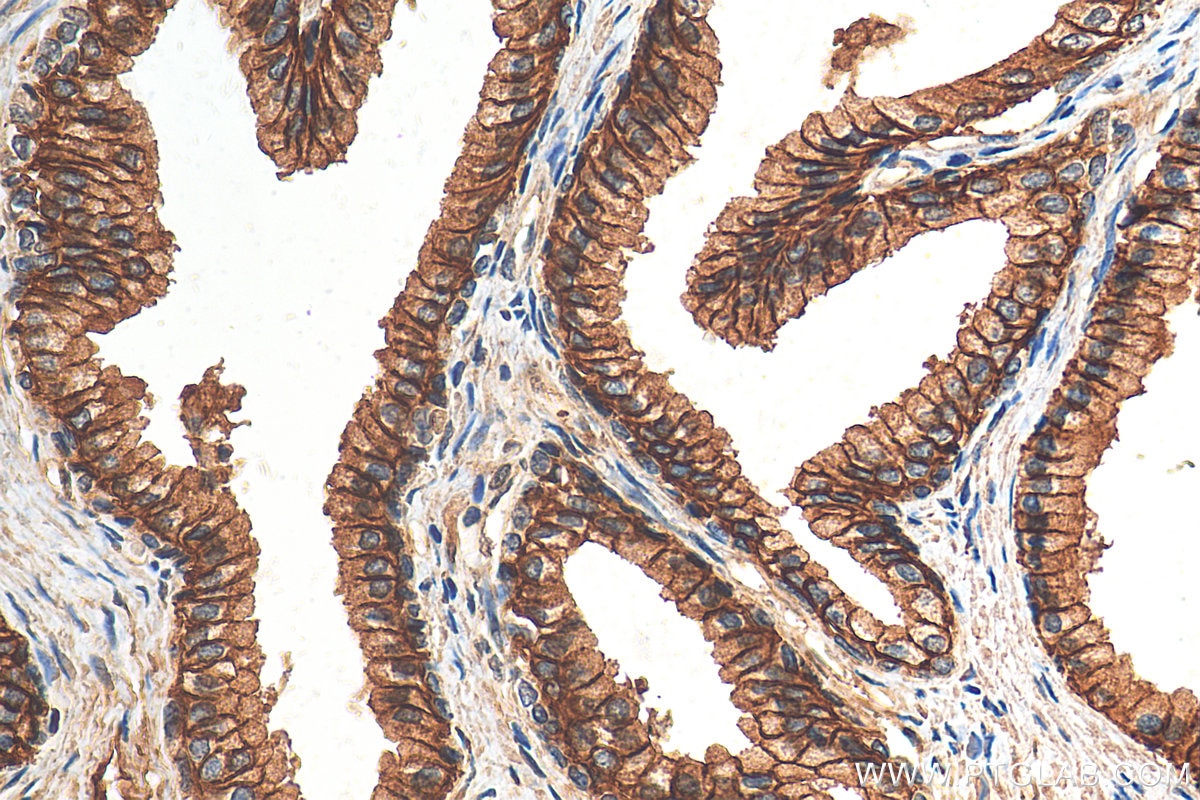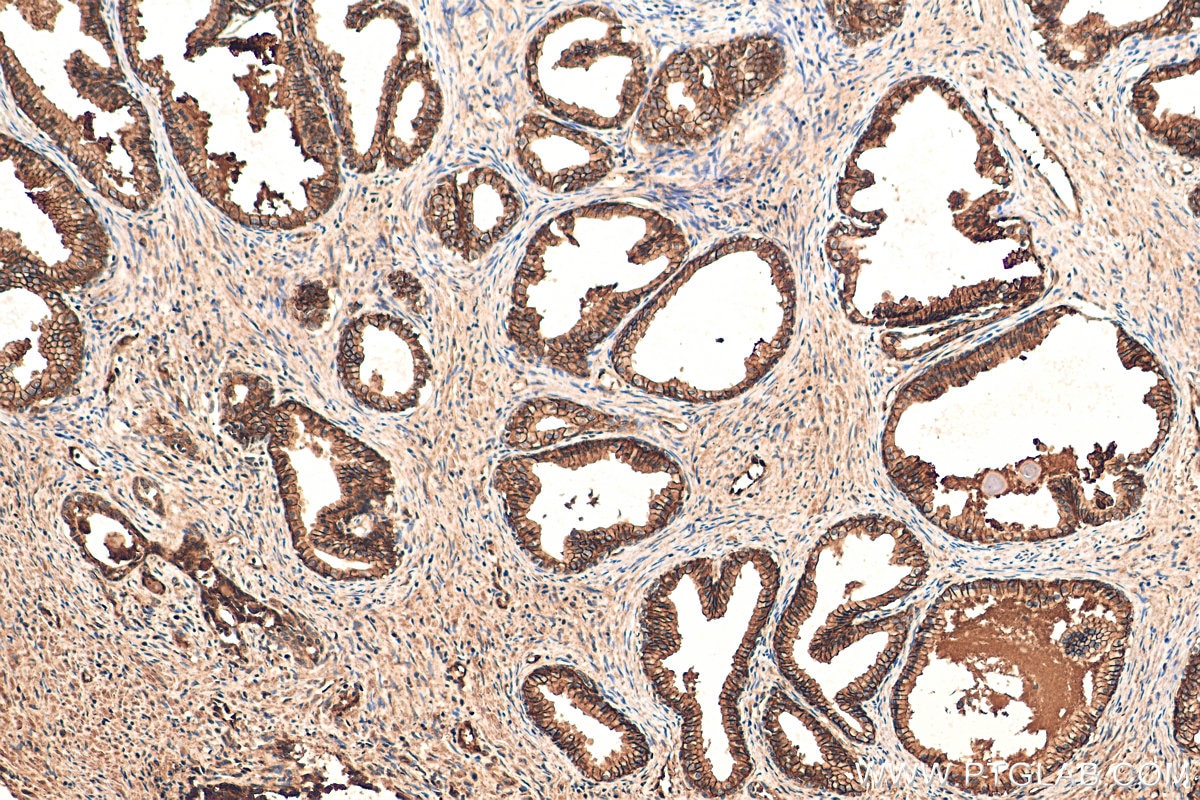Anticorps Polyclonal de lapin anti-AKR1C3
AKR1C3 Polyclonal Antibody for WB, IP, IHC, ELISA
Hôte / Isotype
Lapin / IgG
Réactivité testée
Humain et plus (2)
Applications
WB, IP, IHC, ELISA
Conjugaison
Non conjugué
N° de cat : 11194-1-AP
Synonymes
Galerie de données de validation
Applications testées
| Résultats positifs en WB | cellules A549, cellules HepG2, cellules Jurkat, cellules K-562 |
| Résultats positifs en IP | cellules HepG2 |
| Résultats positifs en IHC | tissu de cancer de la prostate humain, il est suggéré de démasquer l'antigène avec un tampon de TE buffer pH 9.0; (*) À défaut, 'le démasquage de l'antigène peut être 'effectué avec un tampon citrate pH 6,0. |
Dilution recommandée
| Application | Dilution |
|---|---|
| Western Blot (WB) | WB : 1:500-1:2000 |
| Immunoprécipitation (IP) | IP : 0.5-4.0 ug for 1.0-3.0 mg of total protein lysate |
| Immunohistochimie (IHC) | IHC : 1:50-1:500 |
| It is recommended that this reagent should be titrated in each testing system to obtain optimal results. | |
| Sample-dependent, check data in validation data gallery | |
Applications publiées
| WB | See 6 publications below |
| IHC | See 2 publications below |
Informations sur le produit
11194-1-AP cible AKR1C3 dans les applications de WB, IP, IHC, ELISA et montre une réactivité avec des échantillons Humain
| Réactivité | Humain |
| Réactivité citée | rat, Humain, souris |
| Hôte / Isotype | Lapin / IgG |
| Clonalité | Polyclonal |
| Type | Anticorps |
| Immunogène | AKR1C3 Protéine recombinante Ag1674 |
| Nom complet | aldo-keto reductase family 1, member C3 (3-alpha hydroxysteroid dehydrogenase, type II) |
| Masse moléculaire calculée | 323 aa, 37 kDa |
| Poids moléculaire observé | 34 kDa |
| Numéro d’acquisition GenBank | BC019230 |
| Symbole du gène | AKR1C3 |
| Identification du gène (NCBI) | 8644 |
| Conjugaison | Non conjugué |
| Forme | Liquide |
| Méthode de purification | Purification par affinité contre l'antigène |
| Tampon de stockage | PBS avec azoture de sodium à 0,02 % et glycérol à 50 % pH 7,3 |
| Conditions de stockage | Stocker à -20°C. Stable pendant un an après l'expédition. L'aliquotage n'est pas nécessaire pour le stockage à -20oC Les 20ul contiennent 0,1% de BSA. |
Informations générales
AKR1C3(Aldo-keto reductase family 1 member C3) is also named as DDH1, HSD17B5, KIAA0119, PGFS and belongs to AKR1C family. .In humans, at least four AKR1C isoforms exist: AKR1C1, AKR1C2, AKR1C3, AKR1C4 and AKR1C3 shares >86% sequence identity with these three highly related human AKRs(PMID:18574251). It catalyzes the conversion of aldehydes and ketones to alcohols and androgen, estrogen, PG, xenobiotics metabolism. The rat kidney possesses a dimeric form of 75 kDa(PMID:18574251).
Protocole
| Product Specific Protocols | |
|---|---|
| WB protocol for AKR1C3 antibody 11194-1-AP | Download protocol |
| IHC protocol for AKR1C3 antibody 11194-1-AP | Download protocol |
| IP protocol for AKR1C3 antibody 11194-1-AP | Download protocol |
| Standard Protocols | |
|---|---|
| Click here to view our Standard Protocols |
Publications
| Species | Application | Title |
|---|---|---|
Mol Cancer Ther AKR1C3 promotes AR-V7 protein stabilization and confers resistance to AR-targeted therapies in advanced prostate cancer. | ||
World J Gastroenterol Prostaglandin F2α synthase promotes oxaliplatin resistance in colorectal cancer through prostaglandin F2α-dependent and F2α-independent mechanism | ||
Int J Mol Med 15-Deoxy-Δ(12,14)-prostaglandin J(2) induces growth inhibition, cell cycle arrest and apoptosis in human endometrial cancer cell lines. | ||
Neurosci Lett Mangiferin alleviates 6-OHDA-induced Parkinson's disease by inhibiting AKR1C3 to activate Wnt signaling pathway | ||
Eur J Med Chem Development of highly potent and specific AKR1C3 inhibitors to restore the chemosensitivity of drug-resistant breast cancer | ||





